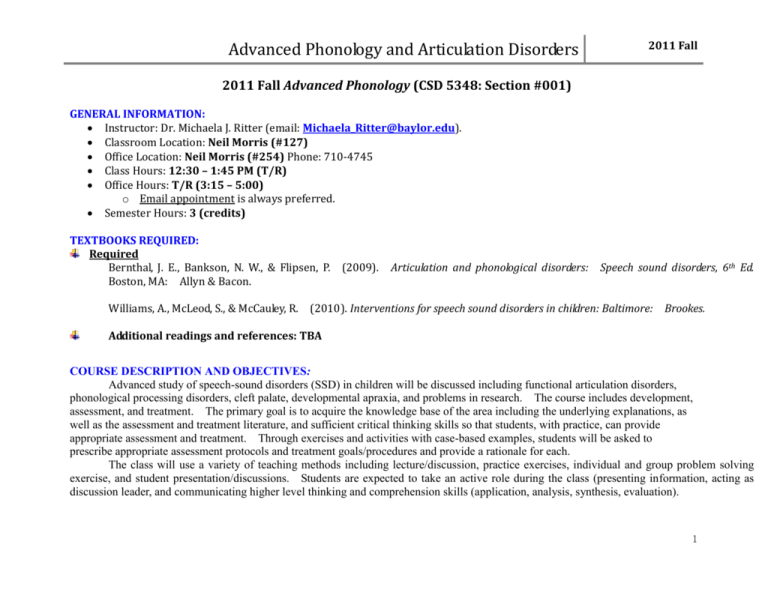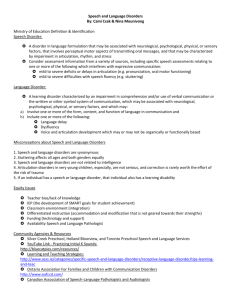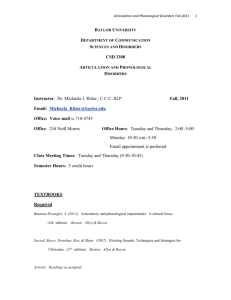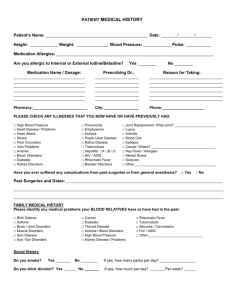CSD 5V48-01 Advanced Articulation and Phonological Disorders
advertisement

Advanced Phonology and Articulation Disorders 2011 Fall 2011 Fall Advanced Phonology (CSD 5348: Section #001) GENERAL INFORMATION: Instructor: Dr. Michaela J. Ritter (email: Michaela_Ritter@baylor.edu). Classroom Location: Neil Morris (#127) Office Location: Neil Morris (#254) Phone: 710-4745 Class Hours: 12:30 – 1:45 PM (T/R) Office Hours: T/R (3:15 – 5:00) o Email appointment is always preferred. Semester Hours: 3 (credits) TEXTBOOKS REQUIRED: Required Bernthal, J. E., Bankson, N. W., & Flipsen, P. (2009). Boston, MA: Allyn & Bacon. Williams, A., McLeod, S., & McCauley, R. Articulation and phonological disorders: Speech sound disorders, 6th Ed. (2010). Interventions for speech sound disorders in children: Baltimore: Brookes. Additional readings and references: TBA COURSE DESCRIPTION AND OBJECTIVES: Advanced study of speech-sound disorders (SSD) in children will be discussed including functional articulation disorders, phonological processing disorders, cleft palate, developmental apraxia, and problems in research. The course includes development, assessment, and treatment. The primary goal is to acquire the knowledge base of the area including the underlying explanations, as well as the assessment and treatment literature, and sufficient critical thinking skills so that students, with practice, can provide appropriate assessment and treatment. Through exercises and activities with case-based examples, students will be asked to prescribe appropriate assessment protocols and treatment goals/procedures and provide a rationale for each. The class will use a variety of teaching methods including lecture/discussion, practice exercises, individual and group problem solving exercise, and student presentation/discussions. Students are expected to take an active role during the class (presenting information, acting as discussion leader, and communicating higher level thinking and comprehension skills (application, analysis, synthesis, evaluation). 1 Advanced Phonology and Articulation Disorders 2011 Fall LEARNING OUTCOMES Link to American Speech, Language, and Hearing Association (ASHA) Knowledge and Skills Acquisition (KASA): http://www.asha.org/uploadedFiles/certification/KASASummaryFormSLP.pdf The ASHA KASA document details the Standards for the Certificate of Clinical Competence for Speech Pathologists (CCCSLP). This document is utilized to demonstrate compliance with accreditation standards related to preparing students to meet ASHA certification requirements. It includes nine main knowledge areas (articulation, fluency, voice and resonance, receptive/expressive language, hearing, swallowing, cognitive aspects, social aspects, and communication modalities) across five clinical parameters (etiology, characteristics, prevention, assessment, and intervention). Because of the importance of the KASA standards in tracking and documenting the student’s achievement related to these knowledge areas and clinical parameters, they are directly related to the Learning Outcomes. Accordingly, the relevant Standards for this course are noted for each Learning Outcome. 1. To develop knowledge regarding the etiologies, characteristics, prevention, assessment and intervention of articulation and phonological disorders in children. (III-B, C, D) 2. To develop knowledge of development, philosophical issues, theoretical models, research based diagnostic and intervention procedures in phonological and articulation disorders. (III-B, C, D) 3. To develop knowledge of atypical speech development (classification of subtypes/phenotypes, differential diagnosis, etiology, explanation) (III C) 4. To design/rationalize an assessment protocol of norm referenced and/or criterion referenced assessment instruments/procedures, given case scenarios (III-D) 5. To obtain knowledge concerning evidence-based practices in diagnosis and intervention with phonological and articulation disorders in children throughout their developmental progression (pre-linguistic, emerging, developing language/phonology, school age, adolescent). (III-D) 6. To acquire knowledge and clinical skills in evidence-based diagnosis and evaluation of children and adolescents from differing cultural backgrounds as well as the ability to To analyze disordered speech using appropriate assessment frameworks (III-D) 7. To identify/rationalize intervention techniques/approaches for a variety of types/ages of SSD (III-D) 8. To acquire the knowledge to design treatment plan for individuals with specific phonological disorders with treatment procedures identified and explained for a variety of types/ages of SSD (III-D) 9. To compare/contrast various models of intervention according to underlying theory, initial targets, procedures, effectiveness/efficacy data (III-D, IIIF) 2 Advanced Phonology and Articulation Disorders 2011 Fall The overall goal of this course is to improve your knowledge and clinical skills in the area of articulation and phonological disorders. 1. Standard III-B: Knowledge of basic human communicating processes including their biological, neurological, acoustic, psychological, developmental, and linguistic and cultural bases. 2. Standard III-C Knowledge of the nature [of articulation/phonological disorders in children] including the etiologies, characteristics, anatomical/ physiological, acoustic, psychological, developmental, and linguistic and cultural correlates; cognitive aspects; social aspects. 3. Standard III-D: Knowledge of the principles and methods of prevention, assessment, and intervention children with articulation/phonological disorders] 4. Standard III-F: Knowledge of processes used in research and the integration of research principles into evidence-based clinical practice STUDENTS WITH SPECIAL NEEDS If you have any special learning needs, please see me during the first week of class so we can be sure you get the proper accommodations. However, before seeing me you must first register with the Office of Access and Learning Accommodation (OALA) (http://www.baylor.edu/oala). OALA: 254-710-3605 Baylor Blackboard: Syllabus, lecture notes, handouts, special announcements, and other class material will be posted on the Blackboard. The student should become familiar with the BB as quickly as possible. Inability to retrieve course information will not be an acceptable excuse for failure to acquire/master the information. If you are registered for the class then you are automatically linked to the course. You will need to check the course site at least once daily. ACADEMIC INTEGRITY Students in this course are expected to firmly abide by the Baylor University Student Honor Code as outlined in the Student Handbook. Students who violate the Honor Code will suffer the consequences: Any evidence of dishonorable conduct (i.e., cheating in and out of the class for class activities such as exams and projects) as outlined in the Baylor Honor Code will result in at least an "F" in this course (http://www.baylor.edu/honorcode/index.php?id=44060). All Honor Code violations will be reported to Baylor University’s Office of Academic Integrity right away throughout the semester and will follow the student through their entire time at the university. Please guard your ethical reputation beginning now. All books/notes/electronic devices must be out of sight during exams. All hats/caps must be removed. 3 Advanced Phonology and Articulation Disorders 2011 Fall Attendance Policy: CSD Major – Attendance Policy: The attendance policy of the College of Arts & Sciences states: “To earn course credit in the College of Arts and Sciences, a student must attend at least 75% of all scheduled class meetings. Any student who does not meet this minimal standard will automatically receive a grade of ‘F’ in the course.” As a CSD Major, you are basically expected to attend all classes. In the event you are unable to attend a class session, it is your responsibility to obtain (a) class notes and/or handouts from another student, and (b) any changes in the class schedule. You are also expected to take tests on time. If you are ill, it is your responsibility to notify the instructor prior to the time of the test. If you miss a test without prior approval from your instructor, you will be subject to receiving a zero for the test. When returning from the illness, it is the student’s responsibility to take the makeup exam within 3 days or the student will automatically receive a zero for the test. COURSE REQUIREMENTS AND ORGANIZATION 1) Class participation a. You are expected to participate in class discussions. b. Any student who misses a class (or any portion of class) has the responsibility for obtaining copies of notes, handouts, assignments, changes to the schedule of topics, activities/assignments, i.e., all of the content covered in class (including any changes). If additional assistance is still necessary, an appointment should be scheduled with the instructor. c. Students are required to conduct themselves according to professional standards at all times, including during classes. Please be respectful of your classmates and your instructor by arriving on time and remaining throughout the entire class session. d. Contact the instructor through email prior to class if you are unable to attend and want to provide a reason for your absence. When needed, you will be asked to turn in supporting documentation(s) such as a doctor’s note. Excused absences will be decided on a case-by-case basis. 2) Preparing for class: a. It is expected that all reading/study assignments applicable to a given class period will be completed prior to the class. b. Prepare for class! 3) Examinations: There will be three in-class exams. discussions/activities. Exam 1: (25%) Exam 2: (25%) Exam 3 (final): (25%) These exams will be based on assigned readings and class 75 % total 100 points possible 100 points possible 100 points possible 4 Advanced Phonology and Articulation Disorders 4) Quiz Fun: There will be four quizzes. These quizzes will be based on transcriptions and course readings. 2011 Fall 10% 5) Article Summary (100 points): 15% total * This assignment: a research paper of no more than five pages that integrates the results of two or three recent (since 2002) experimental research articles about the same treatment model, approach, or technique. a) This written component gives you an opportunity to demonstrate the depth of the knowledge that you have acquired from the articles b) This written component must be reflective and thoughtful. c) This written component must be succinct, clear, and concise. ***LATE ASSIGNMENTS/TESTS--10 POINTS LOST PER DAY Grading Policy: Final grades will be determined according to the following scale: Grade %-ile A >93% A90%-92% B+ 87.0% – 89.5% B 80.0% – 86.5% C+ 77.0% – 79.5% C 70.0% – 76.5% D 60.0% - 69.99% F 59.99% or below 5 Advanced Phonology and Articulation Disorders 2011 Fall Quiz 2: Rubric Using research: Provide a one-page therapy method to share with class: Handout for class and typed Provide theoretical basis and Empirical basis for the intervention Explicit directions provided Article attached for Professor (Method plus research article) Presentation: Explain, Demonstrate with Materials (2-3 minutes) Integration of Information: Rubric Article Rubric: Written component (4-5 pages): (100 points) Provide theoretical basis and Empirical basis for the intervention (15) Results and Discussion: (10) Integration of information obtained from 2-3 articles (30) Your reaction as to the usefulness of the article in terms of intervention practices (10) Reflection: Your thoughts about the topic and how you will choose to use this information or IF (15) Grammar, spelling (5) Organization/clarity (10) APA format (5) Total score:___________________ 6 Advanced Phonology and Articulation Disorders 2011 Fall COURSE SCHEDULE AND ASSIGNMENTS Date (T/R) 1 August 23 2 August 23 3 September 6 4 September 13 5 September 20 6 September 27 7 October 4 8 October 11 9 October 18 10 October 25 Contents Orientation (Syllabus). Study of SSD *Overview of major trends and research in SSD Broad and Narrow Transcription Speech Sound Acquisition Normal Aspects of Articulation Models of Speech Acquisition Classification and factors Related to SSD Organically based disorders etc. Childhood Apraxia of Speech Treatment Approaches and Motor learning Principles Apraxia of Speech Exam 1 (chapter 1-4 and readings) Assignments Due Syllabus Requirements Chapter 1 Chapter 1 and 2 Readings Chapter 3 Readings Quiz 1: September 15 Begin Chapter 4 Chapters 4 *readings Exam 1: Sept. 29th Assessment Procedures Independent & Relational Analyses Chapter 5 Readings Quiz 2: Oct 6 (Method) Assessment Procedures Independent & Relational Analyses Assessment Procedures: Chapters 5 & 6 Readings Chapter 6 Readings Quiz 3: Oct 20 Chapter 6 Readings Informal and Formal Assessment Procedures Exam 2 11 November 1 Direct speech Production Treatment Approaches/Methods 12 November 8 Treatment and approaches/Broad phonological strategies: linguistic-based Exam 2: October 27th Chapter 6 and 7 Readings Chapter 7 Readings Quiz 4: Nov. 10 7 Advanced Phonology and Articulation Disorders 13 November 15 14 November 22 15 November 29 16 December 1 Treatment Language and Dialectal Variations Interventions Interventions Phonological Interventions December 6 & 7 Study Days Final Exam December 13 and phonological strategies: Final Examination: Friday, December 9th, 4:30 pm-6:30pm Interventions 2011 Fall Chapter 7 Readings Paper due: Nov. 22 Chapter 8, Readings Chapter 8 and 9 Readings Chapter 9 Readings Chapter 8 and 9, readings Comprehensive Note: The syllabus is a general plan for the course; reasonable exceptions and changes will be announced to the class when necessary. 8






